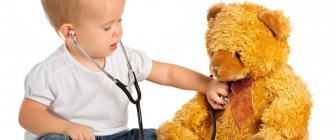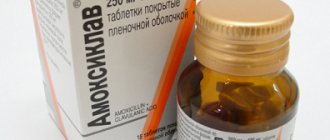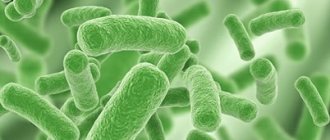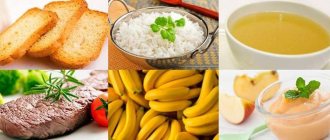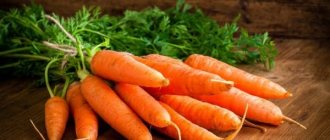Article prepared by:
Vasily Babkinsky
Doctor of the highest category
Diarrhea is a very unpleasant problem that people try to deal with as quickly as possible. Good intestinal function is possible only with a properly formulated diet and adherence to a diet. It is especially important to find out which cereals will be beneficial for diarrhea, and which ones should be avoided so as not to harm your body.
Not all cereals are equally beneficial for diarrhea
Good eating habits
- Eat more slowly. It takes your stomach 20 minutes to signal to your brain that it is full. Therefore, if you eat slowly, you will be able to eat less food and, accordingly, reduce the load on the digestive system.
- Chew your food. When you chew your food thoroughly, you not only slow down your food intake, but also help your digestive system by giving it smaller pieces to digest.
- Don't swallow food quickly. When you swallow food quickly, you also swallow air, which can lead to bloating and poor digestion.
- Eat less and lighter foods. Larger amounts of heavy food take longer to digest, making it harder for the digestive system to work.
- Don't eat late at night. Your digestive system is less efficient at the end of the day, so try to eat at least 3 hours before bed.
Up to contents
How to take for diarrhea
Oatmeal has beneficial properties, but is not able to eliminate the cause of the disease. Only a doctor can decide on the advisability of using it for diarrhea. He will establish the initial cause of why the disease appeared and tell you how to eliminate the source, and not just the symptom.
The doctor will help you decide on your diet and in what quantities and how many times you need to eat porridge. Typically, its use is divided into 4-5 doses per day in small portions to avoid a large load on the stomach.
Find out if you can eat raw oatmeal.
Foods and drinks that cause diarrhea
Every person is unique, so our body reacts to everything differently and at different times. Foods that may cause diarrhea in one person may not cause it in another. You may also find that a product that did not cause a reaction yesterday is causing the problem today.
Check out some foods that can cause diarrhea.
- Alcohol. Your favorite wine or other alcoholic drink may be an irritant to your stomach. But drinks affect everyone differently, so try not to drink those that don't suit you.
- Spicy food. Current research shows that fatty and spicy foods, such as Indian and Chinese dishes, may increase abdominal pain in patients with irritable bowel syndrome.
- Fried and fatty foods. Such foods can increase the contraction of the intestinal muscles during digestion and cause diarrhea.
- Fibrous foods. Many foods are rich in insoluble fiber. For example, bran and wheat are difficult to digest and can lead to diarrhea. Look on the back of the cereal package to see what types of fiber it contains that may not be suitable for you.
- Excess fruits and vegetables in the diet. Eating large amounts of plums, kiwi, beans, broccoli and cabbage can cause diarrhea in some people.
- Dairy products. Milk, cheese, sour cream and other dairy products are known to cause diarrhea. Look out for non-dairy alternatives like almond milk or soy milk.
- Coffee and tea. For many people who often suffer from diarrhea, caffeine causes digestive problems. Try to limit your caffeine intake and drink herbal and green teas instead.
- Sweeteners. Artificial sweeteners (such as sorbitol and fructose) found in diet drinks and sweets can cause diarrhea. This is partly because they are poorly absorbed in the small intestine. Pay attention to the information on the packaging and try to choose natural analogues.
Remember that symptoms may not be caused by the food you just ate, but by what you ate the day before. Also, their appearance may not be to blame for the food itself, but for the speed, time and amount of food eaten.
Up to contents
Features of nutrition for diarrhea
During diarrhea, it is very important to follow the right diet, and then the unpleasant symptoms will not last long. There are several basic nutritional rules that should be followed to treat diarrhea (these rules are also recommended for everyday nutrition):
- eat food more often (5-7 times a day), but in small portions;
- exclude choleretic products from the diet (only during diarrhea);
- exclude sweets - candies, chocolate, cookies, soda, etc.;
- maintain the correct balance of fats and carbohydrates in the diet;
- compose dishes mainly from soft ingredients that do not cause difficulty in digestion (only during diarrhea).
In any case, you will have to give up sweets
Keep a food diary
- Keep a notebook and make notes daily.
- Write down absolutely everything you eat, including condiments, spices (if possible), and drinks.
- Indicate the level of stress during the day. You'll be surprised how powerful stress can have on your digestive system.
- Study the composition of food. Pasta, pizza and sandwiches are different foods, but they can all contain wheat.
- Start with a general approach and then pay attention to the ingredients. This way, by first learning about the foods that don't suit you, you can determine which individual ingredients you should avoid.
- Keep a diary for a long time. At first you may not notice the connection, but over time everything will become clear and you can discuss the problem with your doctor.
Up to contents
Recipe
There are many recipes for preparing cereal dishes, but not all of them are effective in eliminating diarrhea.
To prepare healthy oatmeal for diarrhea, you need to follow these steps:
- Take ½ cup oatmeal.
- Fill with water and leave for 1 hour.
- Drain the liquid, then add 1.5 cups of clean water.
- Bring to a boil over low heat until the porridge has the consistency of jelly.
In order for the oatmeal to be soft and its beneficial properties to be preserved, it must be boiled until boiling for at least 15 minutes. This formulation is considered the most effective in treating diarrhea. In addition to oatmeal, the menu can include herbal teas, for example, chamomile or St. John's wort.
Is fiber a problem for you?
In some people, a high-fiber diet may cause or worsen diarrhea. But keep in mind that there are two types of fibers.
Soluble dietary fiber. It is present in most citrus fruits and vegetables such as potatoes and legumes. This fiber may be helpful for diarrhea because it absorbs water and makes stool harder.
Insoluble fiber. It can be found in bran, whole grains, rice, and the skins of some fruits and vegetables. It may help with constipation, but worsen symptoms with irritable bowel syndrome and recurring diarrhea. This doesn't mean you should avoid insoluble fiber if you have diarrhea. Just be careful about what you eat and what effect these foods have on you.
The information in this article is for reference only and does not replace professional advice from a doctor. To make a diagnosis and prescribe treatment, consult a qualified specialist.
What are the benefits of oatmeal for diarrhea?
To get rid of painful symptoms, you need to restore the proper functioning of the intestines. Oatmeal, cooked in water without salt and sugar, can cleanse the body of the accumulation of harmful toxins and waste.
Before taking oatmeal for medicinal purposes, you should consult your doctor to rule out the presence of a gastrointestinal infection.
- Oatmeal contains fiber, which has the following effects on the body:
- improves intestinal motility and secretion of its glands;
- softens stool and promotes the movement of feces.
Oatmeal relieves inflammation in the stomach well. The jelly-like shape of the dish helps protect and relieve pain on its walls, delicately enveloping them. Oatmeal is beneficial for people with irritable bowel syndrome. It will help eliminate discomfort, bloating and constipation.
Did you know? Oatmeal absorbs odors well. To remove the unpleasant smell in the refrigerator, you need to leave a handful of cereal grains on one of the shelves.
Can porridge cause diarrhea?
Some people believe that they develop diarrhea after eating porridge. Could this be possible?
In fact, some cereals contain substances that can cause an allergic reaction and, as a result, intestinal upset. In particular, if you are lactose and gluten intolerant, you should be careful when consuming cereals that contain:
- rye;
- barley;
- wheat.
We recommend: Why does diarrhea occur at night?
A negative reaction can also be caused by porridge prepared with milk, since this product promotes fermentation processes. Diarrhea develops less often after milk porridge in children, since their intestines are more adapted to the absorption of such products.
Can oatmeal cause diarrhea?
Typically, eating oatmeal does not have any negative consequences for an adult. You should give this dish to a child under one year old with caution . Diarrhea from oatmeal in water can only develop if you are intolerant to the components of this product. Also, it should be taken with caution by people who have diabetes.
If a cereal product was prepared with milk, then diarrhea can develop not only in the event of an allergic reaction to the cereal, but also to lactose or other components contained in the milk. Before cooking, it is important to pay attention to the expiration date and condition of the ingredients. Products with an expired use date can cause not only diarrhea, but also more serious consequences, such as poisoning.
Important! B vitamins contained in oatmeal affect a person’s emotional state. Regular consumption of porridge will eliminate fatigue and problems with falling asleep.
Oatmeal is a valuable source of fiber and vitamins. It has a cleansing effect on the gastrointestinal tract and helps with diarrhea. It is important not to overuse the product, as this can cause heaviness in the stomach and additional unpleasant symptoms: pain and bloating.
Which cereals are contraindicated
During diarrhea, cereals are a staple part of any diet. It is important to cook them exclusively in water, without oil and sugar. You should not eat pearl barley, barley and millet porridge if you have diarrhea. They can lead to heaviness in the stomach and indigestion.
Did you know? French doctor Jean de S. Catherine lived to be 120 years old. He believed that he managed to live to this age because of the daily use of oatmeal infusion.
- There is a list of foods that you should avoid eating during diarrhea:
- fatty and fried foods;
- dairy products, excluding yoghurt;
- soda and alcohol;
- spices and smoked products;
- bread;
- pickles and canned food;
- fresh vegetables and fruits;
- sweets.
Benefits of eating cereals
When diarrhea and vomiting, eating cereals has a beneficial effect on the body. That is why experts recommend preparing such dishes for children and adults with digestive problems.
A diet based on porridge has the following effects:
- the body is naturally cleansed;
- the porridge envelops the walls of the stomach and intestines and peristalsis improves;
- These dishes contain carbohydrates that effectively nourish the body, but are slowly absorbed.
In both adults and children, the causes of intestinal disorders are usually common. To cope with the problem, you must follow the rules of dietary nutrition.
Diarrhea in women who are breastfeeding
Diarrhea during breastfeeding is often associated with stress.
As you know, diarrhea in a nursing mother is often associated with stress, in such a situation you shouldn’t worry too much, you need to try to ensure a calm environment and everything will fall into place.
But if mucous or bloody discharge is found in a woman’s stool, she feels nauseous or vomits, then you should sound the alarm; perhaps an upset stomach is caused by an infectious disease.
You will probably have to stop feeding your baby breast milk, as the baby may also “catch” the disease. If there is no danger, then there is no need to stop breastfeeding, you just need to reconsider your diet, give preference to steamed dishes and temporarily stop eating vegetables, fruits, sweets, baked goods, spices and other foods that irritate the intestines.
